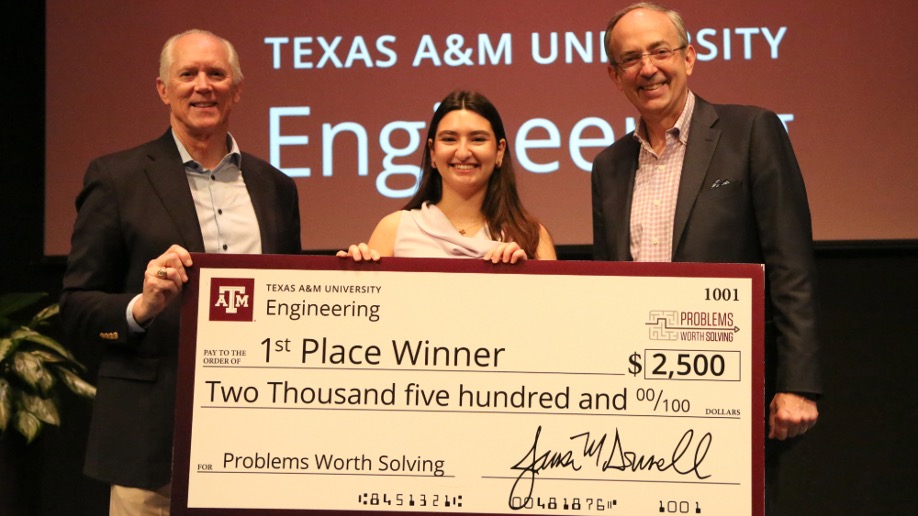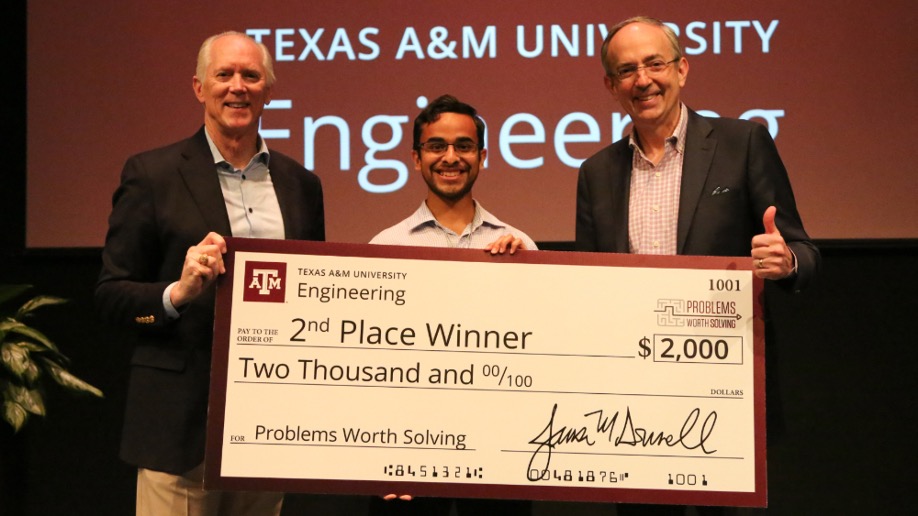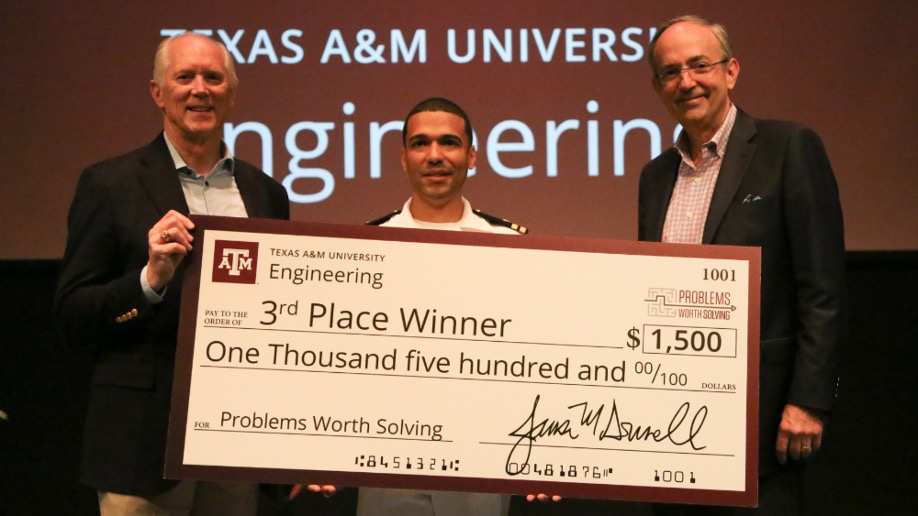The Meloy Engineering Innovation and Entrepreneurship Program hosted the second annual Problems Worth Solving, a College of Engineering pitch competition that invites Aggies of all majors to explore critical problems that could potentially serve as the basis for new startups or investments.
The Problems Worth Solving Competition does not ask students to find a solution to their problem; rather, students focus on pitching the significance of the problem itself. In this unique event format, participants navigate a critical element of entrepreneurship: the user experience.
The contest requires participants to submit an application of short answers and a 60-second video pitching their problem. The top five finalists are invited to present five-minute problem pitches live in front of judges.
The leading participants in this year's competition placed significant emphasis on customer discovery interviews and embraced a human-centered design approach by engaging in meaningful dialogue with the communities most impacted by the problems they chose to address.

Public health student Diana Salha won first place in the competition and a $2,500 award. Her pitch centered around themes from over 200 personal interviews with patients who were admitted to the hospital for routine surgery and contracted catheter-associated urinary tract infections (CAUTI), leaving them with the life-altering after-effects of sepsis. CAUTIs are the most common hospital-acquired infection in the U.S., yet as urinalysis tests are not often conducted until symptoms arise, it is incredibly hard to catch the infection before early sepsis.
“I think it’s really important to know how to tell a story in a concise and eloquent manner, and that can be really difficult sometimes,” explained Salha. “The team at Problems Worth Solving really helped a lot in getting me to the point where I could tell an effective story. The mentorship they brought throughout the process of this competition has given me skills that I will be able to use throughout my career.”
In addition to the first-place title, Salha earned the distinction of being a guest sponsor for a 2024-25 Aggies Invent centered around identifying solutions to her winning problem. Salha will have the opportunity to present the problem statements, offer guidance throughout the event and serve as one of the judges.

Pre-med computer engineering student Nathaniel Fernandes was awarded second place and $2,000 for presenting the problem of denied medical insurance claims. Insurance companies deny billions of claims annually in the U.S., and denied claims often remain unresolved, forcing doctors to increase the cost of services to the patient. Reimbursements commonly face delays and private practices lack the resources to employ specialized billing staff, exacerbating the situation.
“I almost didn’t apply to Problems Worth Solving because I was afraid I couldn’t do it, or that my ideas weren’t good enough,” Fernandes reflected. “With great mentors, I was able to see that my ideas are truly valuable. Overcoming imposter syndrome and gaining this confidence in myself is key to any endeavor I take part in, and I’m really grateful for this opportunity to do so.”

Alberto Rodriguez, a civil engineering master’s student with ten years of experience as an active-duty naval officer, was awarded third place and a $1,500 prize for his pitch surrounding the threat of unmanned aerial vehicles (UAVs) on international trade. UAVs are difficult to detect and expensive to combat, and they contribute to rising disruptions in the supply chain, which impacts the world economy and puts troops at risk.
“What we are seeing today is an unprecedented use of UAV technology aimed at harming global trade,” asserted Rodriguez. “Preserving trade is vital to preserving the American way of life. This problem is near and dear to me and is certainly a problem worth solving.”
Winning fourth place, biomedical engineering student Suchitaa Sawhney, shed light on the threats of antimicrobial resistance, a prevailing problem in the medical industry. This phenomenon occurs as germs and bacteria evolve to resist treatments, a cycle exacerbated by the persistent use of antibiotics.
Fifth-place winner, doctoral chemical engineering student Aakansha Shaji presented a widespread problem found in her research: the complications associated with the Helicobacter pylori (H. pylori) bacterium. A chronic H. pylori infection can develop into gastritis, ulcers and stomach cancer, and most antibiotics are resistant to the bacteria.
“There is a long and rich history of investigators trying to understand how this bacterium causes extreme complications,” said Shaji. “Despite their greatest efforts, fighting it seems like an elusive dream.”
Three honorable mentions — Reid Smith, Digvijaysinh Barad and Sam Rice — were awarded $250 each.
Problems Worth Solving is a unique event that offers students a platform to pitch problems that they’re passionate about, and often, ones that form the very foundation of their collegiate research endeavors.
“I wrote my college application essays about this problem,” Sawhney explained. “Now, as someone entering the healthcare field next year, this issue hits very close to home. It’s been my mission for the past four or five years — it’s imperative that we find a solution.”